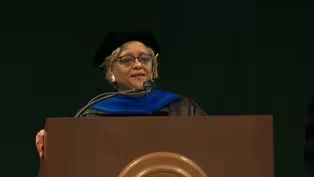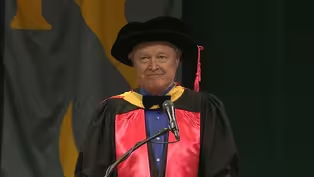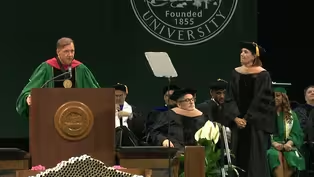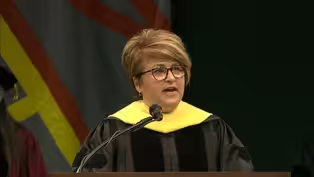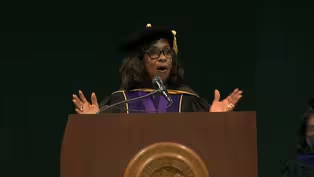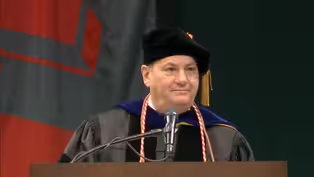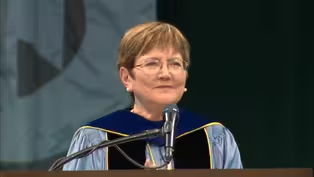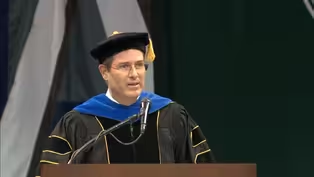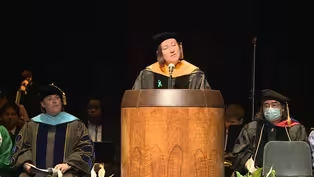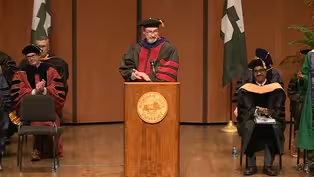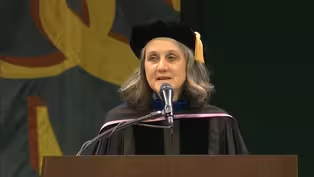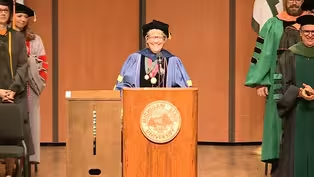MSU Commencements
Residential College in the Arts and Humanities | Spring 2022
Season 2022 Episode 14 | 1h 26m 10sVideo has Closed Captions
Residential College in the Arts and Humanities | Spring 2022
Residential College in the Arts and Humanities - Spring 2022 Commencement Ceremony from Wharton Center on May 7, 2022
Problems playing video? | Closed Captioning Feedback
Problems playing video? | Closed Captioning Feedback
MSU Commencements is a local public television program presented by WKAR
For information on upcoming Michigan State University commencement ceremonies, visit:
commencement.msu.edu
MSU Commencements
Residential College in the Arts and Humanities | Spring 2022
Season 2022 Episode 14 | 1h 26m 10sVideo has Closed Captions
Residential College in the Arts and Humanities - Spring 2022 Commencement Ceremony from Wharton Center on May 7, 2022
Problems playing video? | Closed Captioning Feedback
How to Watch MSU Commencements
MSU Commencements is available to stream on pbs.org and the free PBS App, available on iPhone, Apple TV, Android TV, Android smartphones, Amazon Fire TV, Amazon Fire Tablet, Roku, Samsung Smart TV, and Vizio.
Providing Support for PBS.org
Learn Moreabout PBS online sponsorshipMore from This Collection
May 5-May 14, 2022
College of Human Medicine | Spring 2022
Video has Closed Captions
College of Human Medicine | Spring 2022 (2h 49m 1s)
College of Natural Science | Spring 2022
Video has Closed Captions
College of Natural Science | Spring 2022 (2h 39m 34s)
Undergraduate Convocation | Spring 2022
Video has Closed Captions
Undergraduate Convocation | Spring 2022 (1h 21m 59s)
College of Agriculture and Natural Resources | Spring 2022
Video has Closed Captions
College of Agriculture and Natural Resources | Spring 2022 (1h 40m 31s)
College of Engineering | Spring 2022
Video has Closed Captions
College of Engineering | Spring 2022 (2h 3m 1s)
College of Education | Spring 2022
Video has Closed Captions
College of Education | Spring 2022 (1h 42m 47s)
College of Arts and Letters | Spring 2022
Video has Closed Captions
College of Arts and Letters | Spring 2022 (1h 20m 30s)
Lyman Briggs College | Spring 2022
Video has Closed Captions
Lyman Briggs College | Spring 2022 (1h 25m 22s)
James Madison College | Spring 2022
Video has Closed Captions
James Madison College | Spring 2022 (1h 35m 50s)
College of Social Science | Spring 2022
Video has Closed Captions
College of Social Science | Spring 2022 (2h 48m 10s)
College of Nursing | Spring 2022
Video has Closed Captions
College of Nursing | Spring 2022 (1h 44m 11s)
Providing Support for PBS.org
Learn Moreabout PBS online sponsorship(upbeat music) (audience applauding) - It is our pleasure to join one another today to celebrate the graduation of the 12th entering class of the Residential College in the Arts and Humanities.
(audience clapping) If able and willing, all please rise for the singing of "America the Beautiful," accompanied by the MSU Jazz Orchestra II under the direction of Diego Rivera.
("America the Beautiful") Thank you for the performance.
Please be seated.
(audience clapping) Let me begin by acknowledging that Michigan State University occupies the ancestral traditional and contemporary Lands of the Three Fires Confederacy of Anishinaabeg, the Ojibwe, Odawa, and Potawatomi peoples.
In particular, the university resides on Land ceded in the 1819 Treaty of Saginaw.
On behalf of the Residential College in the Arts and Humanities, we recognize, support, and advocate for the sovereignty of Michigan's 12 federally recognized Indian nations for historic indigenous communities in Michigan, for indigenous individuals and communities who live here now.
And for those who were forcibly removed from their homelands.
By offering this land acknowledgement as has become increasingly common here at Michigan State and other places, we affirm indigenous sovereignty and the complicated history of the land-grant university.
Now let me ask the class of 22, if they're able to, please rise and turn towards their caregivers, parents, family members, either given or chosen and important loved ones.
It is through the support of these individuals that enable your success.
Please give them a round of applause.
(audience applauds) Next, let me ask the class of 2022 to remain standing, again, if they're able and turn back towards the main stage and the RCAH faculty and staff who have guided you on your journey.
As you look at this group of RCAH leaders, I hope that many memorable thoughts about your time in the Residential College come to mind.
Each of those individuals here on the stage has committed themselves to excellence in undergraduate education and to making RCAH the place, it is today.
Please join me in thanking them for your support, for their support and in your respective and collective journey.
(audience clapping and applauding) I would also like to name an honor to recognize some of those who have made your RCAH journey and this evening possible.
Please reserve your applause until all the names have been read.
Members of the platform party include, and if you could please sit down when your name is read, the honorable Dr. Rema Vassar, MSU Board of Trustees, Associate Dean Scot Yoder, Associate Dean Joanna Bosse, Ray Shalu, class of 2016, and your RCAH faculty and academic specialists, Eric Aronoff, Steve Baibak, Kevin Brooks, Guillermo Delgado, Vincent Delgado, David McCarthy, Terese Guinsatao Monberg, Laura MacDonald, India Plow, Jeno Rivera, Lauren Russell, Christopher Scales, David Sheridan and Estrella Torrez.
And a number of our faculty couldn't make it this evening.
And those include John Aerni-Flessner, Steve Esquith, Tama Hamilton-Wray, Marsha MacDowell, and Sitara Thobani.
Please give them a round of applause.
(audience applauds) I'd also like to recognize RCAH staff who include, and if you are here, if you could kindly stand, Morris Arvoy, Marcus Fields, Allison Fox, Laurie Hollinger, Elizabeth McCarthy, Kate McGormley, Andrew Midgley, Pam Newsted, Kristin Phillips, Rugelio Ramereiz, and Amber Walberger.
(audience applauds) As a part of RCAH, it'd be remiss to not recognize our community partners, friends and supporters who are also here in the audience.
So if you're a member of a community partner, also, please stand.
And finally, let me thank Andrea Cliver and her colleagues for providing the captioning for our ceremony today.
It's also important to thank the Wharton Center staff for hosting us on this important day.
And finally, all of those workers who've made this evening possible.
Thank them.
A round of applause, please.
(audience applauds) I would now like to introduce the honorable Dr. Rema Vasser of the MSU Board of Trustees.
In addition to her role on the board, trustee Vasser also serves an associate professor in the college of education at Eastern Michigan University.
She earned her doctorate from UCLA and focuses her research on issues of equity, justice, access, and inclusion, and education for minoritized communities.
We thank her for her work on the board, trustee Vasser.
(audience applauds) - Thank you, Dean Miner.
On behalf of the MSU Board of Trustees, I welcome all the graduates, their families, their friends, and all the people who are here attending tonight's undergraduate ceremony.
Under the Michigan constitution, the board of trustees is the governing body of the university by whose authority degrees are awarded.
So here we are to award you.
Today's ceremony represents the culmination of discipline, intellectual work, and creative imagination.
Certainly no small accomplishment given all that we've gone through in the last couple of years.
For many of you and your families here today, the sacrifices have been long and great.
The degree you have earned acknowledges your success and honors those who have encouraged it.
Our wish is that you will always be leaders who generously use your intelligence and your knowledge to improve the quality of life for your community to advance the common good, and to renew hope in the human spirit.
Our faculty, the administrators, and the MSU trustees are all very proud of you.
Please accept our warmest congratulations and our best wishes.
Give yourselves a hand.
(audience clapping) I would also like to take this moment to recognize two of RCAH's graduates who have received the board of trustees awards.
They have achieved a 4.0 GPA at the end of their undergraduate career at Michigan State Universities.
Congratulations to Berkley Sorrells, (audience applauds) and Lydia Williams.
Yay.
(audience applauds) Job Well done, women.
Thank you.
- Thank you, trustee.
I would now like to welcome Associate Dean Scot Yoder to the podium.
Scot.
- Looks like you're gonna have to listen to me one more time.
(audience laughs) Congratulations, RCAH class of 2022.
You've arrived at your commencement.
To commence, to begin.
I know this is a serious occasion, but isn't it funny that we use the word commencement for your last thing you do as an undergraduate.
What's up with that.
Of course, I'm gonna answer my own question, 'cause you've been with me too long, you know how that works.
Perhaps with the exception of being born, when we commence something, we typically end something else.
Commencement, in this sense, suggest a transition.
News flash, life is full of transitions.
Most are small, but the more significant ones, for example, coming of age, getting married, retiring and dying, we commemorate with special ceremonies.
The transition we commemorate tonight ranks right up there.
You are moving from the student phase of your life, where you spent the last, what 17 or so years, with kindergarten, I add that in, to the non-student phase of your life, what some people call the rest of your life.
As significant as this transition may be, it won't necessarily be easy.
The only thing for certain is, well, uncertainty.
I know this from experience.
When I graduated from college 39 years ago, I was certain of only three things.
And as it turns out, the first two didn't count.
First, I knew I was graduating with a degree in church ministries.
Don't snicker.
(audience laughs) Second, I knew that the last thing I wanted to do was to be a pastor.
So in a real-life equivalent of a grammatical double negative, I managed to turn two certainties into one huge uncertainty.
I had no job lined up, and I wasn't sure what I wanted to do.
In retrospect, the only thing I knew for certain was who I wanted to spend my life with.
The third one counted.
Transitions are filled with uncertainty, but if it's any comfort, you are not alone.
While you've spent the last year planning for your future, RCAH has been in the process of transition as well.
Last summer, Steve Esquith, or Dean Steve, the Dean of our college since it opened 15 years ago, stepped down, and Professor Dylan Meyer stepped up to become the interim Dean.
Since that time, RCAH faculty and staff have been engaged in a process of strategic planning to map out our next 15 years.
Like you, we are asking, what do we want to do?
Who do we want to be?
There have been individual transitions as well.
In the past year, Nikki Rudolph, our Director of Student Affairs left to become an assistant Dean in Lyman Briggs College, and Sahar Mahmood, our Student Affairs Coordinator left to become the Associate Director of Multicultural Affairs at Smith college.
Over the next few months, professors Joanna Bosse and Chris Scales will be ending their time in RCAH, and beginning a new phase of their careers in the College of Music.
It is hard to say goodbye.
But we're excited about the opportunities that lie before them.
While Steve and Sahar could not be here tonight.
Nikki, Chris, and Joan are, and please join me in thanking them for the years of service to the college.
(audience clapping) Finally, I'm going through something of a transition too.
In about a week, I'll be ending my administrative role as Associate Dean of students and returning to full-time teaching and research in the college.
Tonight, however, is not about that.
It's about your transition.
I can't erase the uncertainty and wouldn't even if I could, that future is yours to create.
However, I can tell you honestly that I am confident in your ability to make this transition successfully.
And I'm optimistic about your future.
This is not naive confidence.
With age comes, if not wisdom, at least some perspective.
And from my experience of both making transitions and walking with others as they make theirs, I see good reason to be hopeful.
Let me give you three.
Reason number one, you are resilient.
Think of what you've experienced in the last four years.
When you came in August of 2018, MSU was reeling from the news that one of our faculty, a physician, had abused literally hundreds of young women.
You have been part of a community that has been coming to terms with that knowledge.
You have also lived through a pandemic.
Many of you have lost loved ones.
And even if you have not, your lives and education have been disrupted.
Who can forget returning from spring break in 2020 only to be told that we needed to go home and shift to remote teaching and learning.
Since that time, uncertainty has been the norm.
We're gonna be in person, no wait, we're gonna be remote.
Now we're gonna be vaccinated, masked, and in person.
Now we need to go back to remote, then we'll come back in three weeks and be in person.
To say that it took a toll and all of us would be an understatement.
Finally, you've lived through social unrest, the likes of which our nation hasn't seen since the 1960s.
Police brutality against African Americans and other people of color.
While not new was made increasingly visible through cell phone, video, and social media.
Protest and demonstrations took place around the country, and violence too often erupted as counter-protesters and police responded.
It became clear we have not come to terms with our long history of racism and social inequality.
All this was happening at a time when our growing political divisions were ramped up by a presidential election.
So contentious, we faced a shocking possibility that, for the first time in our national history, there might not be a peaceful transfer of power.
And yet here you are, you completed your degree.
You persisted, you are resilient.
Second reason, reason number two, you are better prepared than you might think.
Over the last four years, you have developed knowledge and skills that have prepare you well to handle not only this transition, but the constant stream of transitions that you will make throughout your life.
Almost 40 years ago, Francis Brodrick argued that the goal of studying the humanities was to develop what he called a liberally educated person.
Here's how he describe such a person.
See if it sounds familiar, "A liberally educated person is someone who never stops learning, who possesses skills and analysis and synthesis, thinking critically, reading accurately, writing clearly and speaking confidently.
Who demonstrates the capacity to adapt to the unpredictable cultural, economic, political, and technological changes that will affect their careers over a lifetime.
Who acts out of a commitment to thoughtfully develop system of values while at the same time, respecting the value systems of others.
And finally, who recognizes that the present moment contains both the past and the future.
A past full of diverse histories that shape how we each understand the present, and a future full of possibilities that beckon us to realize our individual and collective ideals."
These are not just the characteristics of a liberally educated person.
They're the characteristics of a person who is prepared to navigate transitions.
I hope you see them in yourself.
We see them in you.
Reason number three.
You are an RCAH educated person, or dare I say RCAHED person.
(audience laughs) Okay, sorry, I couldn't resist that.
Those of you outside of RCAH will have to ask your graduates to explain that pretty lame inside joke.
I've been in higher education for more than 30 years, worked in four institutions and taught literally thousands of students.
Most of them fit this description of a liberally educated person, but having spent the last 15 years in RCAH, I've come to appreciate three particular qualities that I observe, not only in our students, but also in our alumni, as they make their way in the world.
Certainly, other students exhibit these qualities, but I see them so distinctly and consistently in our students and alumni that I have come to think of them as RCAH virtues.
Creativity, creativity is both an ability and a disposition.
It's the ability to generate ideas and envision possibilities, but it is also the disposition to explore new ways of thinking, to discover new connections, and to work with others to generate new solutions.
This is a habit we can develop in ourselves and encourage in others.
And it is part of the very fiber of RCAH.
I am fond as saying that RCAH students are creative, but I am quick to add that I don't mean they're all artistic.
You are creative in the way that you approach your education, your work, and your lives.
Courage, if resilience says something about your ability to handle transition, courage has to do with your orientation to it.
Courage is a response to fear, not a lack of it.
A person who is courageous responds to uncertainty by leaning into it over and over again.
I have seen you lean into challenges in your classrooms, in creative spaces, on your study abroad programs in your community engagements.
While the hallmarks of an RCAH education is engaged learning.
To be actively engaged is to take risks, and that is courageous.
If you think you aren't courageous, consider this, there is something out outrageously courageous about believing you can change the world through the arts and humanities, in a culture that constantly tells you that real change happens through science, technology, and the markets.
You're courageous.
Finally, compassion.
Compassion is concern for the suffering of others and a desire to alleviate it.
It requires but moves beyond empathy.
To live compassionately is to live as if others truly matter.
To recognize not only their suffering, but also their dignity.
To seek to understand the world from their point of view, recognizing that even when you can't fully do so, they still have a point of view to be understood, to be heard and respected.
Compassion is empathy plus respect and action.
I see this in how you interact with others, in how you listen in order to understand, and try again when you don't.
In how you raise up the stories of those whose stories have been ignored and in how you empower people to tell their own stories.
I hesitate to single out any one of you on a night when we're celebrating all of your accomplishments, but I want to end with a brief story that beautifully illustrates these virtues.
A few weeks ago, I had the pleasure of attending an event where six students in the documentary film program at MSU screened their documentaries at a local theater.
Your classmate, Julia Stroman, was one of those students.
Shout out, Julia.
(audience applauds) For the sake of time, I won't go into all the details, but in her documentary, Julia tells the story of a difficult and painful conflict in her extended family.
It was a story involving the complex, and sometimes volatile mixture of love, family, religion, and sexuality.
There was so much to like about this piece.
I was impressed with the creativity, the filming, the editing, the storytelling, the decision making that allowed Julia to tell a compelling story in 10 minutes.
I was inspired by her courage to explore, and her family's courage to share a story so painful and heart-wrenching.
It's one thing to explore issue at arm's length and quite another to ask difficult questions of those that you love.
But most of all, I was deeply moved by the compassion.
This could have been told as a one-sided story of right and wrong, with heroes and villains, but Julia did not opt for that easy trope.
Instead, she showed respect and care for all the people involved.
She showed compassion.
Thank you, Julia, for that gift.
If given the time and opportunity the faculty and staff in front of you tonight could tell many such stories, reflecting the creativity, courage, and compassion with which you have approached your education and which we hope... No, we expect, insist, demand, choose your word, you to carry into the future.
That is what it will mean to live your learning.
Class of 2022, we are proud of what you have accomplished and of who you are.
We are confident in your skills you have developed and the wisdom you have shown, and how to use them.
We are excited for the opportunities that await you and wish you many, many rewarding transitions.
Thank you.
(audience clapping) - Thank you, associate Dean Yoder.
And I think with creativity, courage, and compassion, we now are RCCCCAH.
So I just had to get that one in there.
(audience laughs) My apologies.
I would now like to introduce Thomas Noble, a music performance major in the College of Music who will be performing "Harlem Nocturne."
("Harlem Nocturne") (audience applauds) Thank you, Thomas, Professor Rivera, and the entire Jazz Orchestra.
Now, I would like to introduce our first senior class speaker, Iliana Cosme-Brooks.
Iliana.
(audience applauds) - Hello.
Wow, a speech.
Okay, so as with everything, RCAH, let's start by taking a moment to self-reflect.
Do this in any manner you choose, whether that's metacognitive thinking, or maybe you brought your watercolors and or yoga mat with you.
This is probably the last time we'll do this in an RCAH space.
So, let's basket in insert dramatic pause.
That's dramatic enough.
So (Iliana giggles) some of you may know me, and some of you may not.
Technically, I've been your student body president for the past two years, which is fun.
You may have seen me haunting the halls of SciFi like many of us have.
Absorbing the sights and sounds of this extremely special building while trying to ignore all the cockroaches.
(audience laughs) I've never learned more about astrology than I have sitting around a half complete puzzle in the student center, learning about moons and suns and whatever.
I spent many nights in the art studio upcycling pringle cans and making friends with the girl who had cut apart a pair of pants in the middle of the night who now occasionally does ballet in our living room.
I remember walking through the basement in awe over all the art on the walls, then walking quickly past the stench of the trash room to get to the theater in time for a Wednesday night live that started with a BoJack Horseman reference.
for a reason, I still do not understand.
(audience laughs) I could not have told you what RCAH would teach me when I first got to MSU in August of 2019.
Now I have issues summarizing what I've learned from trying and frankly, failing to yodel in an impromptu section of bossy African music class.
It's now having a collection of amateur community engagement watercolors.
From writing and recording songs at a very uncomfortable desk chair in my childhood bedroom to zooming into Costa Rica twice a week, to talk about bridges.
(audience laughs) From writing extensively about a biting baby for the sake of sociolinguistic research, to talking about slutty country music and salsa dancing in the theater, RCAH has taught me a lot, and I didn't expect any of it.
And I don't think any of us expected what RCAH was about to throw at us.
We all have so many memories caught in the walls of Snyder Phillips and beyond.
Let's not forget Royal's trips to the Mabit room where we've hauled entire living rooms of furniture across the street for the sake of our art, or the field trip to the Summer Circle for filming my salsa dance Spanish aisle, where I tried my hardest not to be on camera.
But there's always a bit of excitement in finding a new sticker out on the table in the LMC, or to see someone you know, studying in the pillow room while other people are loudly playing some video game in the corner.
There's nothing like running into Dean's Steve, while carrying a giant bag of recyclables on the way to the basement or wandering around the lookout between classes, then taking a creepy picture of your friend who's down in the calf.
Then going back to the calf when you had a meal plan, just to get an ice cream cone at 10:00 PM.
Anyway, the last couple of years have flown by for better or for worse.
And now we're gonna be doing something different.
Yes, some of us want to stay, but we can't, even if we try to fail a class.
Instead of getting a zero, you would most likely instead get an email from your professor asking if you're okay.
That is one thing we all have in common.
The relentless, never-ending support that RCAH has provided us in every class and in every endeavor from freshman year to now.
That's why I'm so excited to be an alumnus with all of you, for the opportunity to swap stories with RCAH people, old and new, months and years from now.
So, I actually grew up in mid-Michigan and spent so much time on campus as a kid.
And I had no idea that there was such a special community hidden away in one of the dorms, especially not the one across the street from farmhouse.
I never thought that I could be an artist, a writer, a musician, a volunteer, and a researcher all at once.
I didn't know how important reflection is or how much joy comes from seeing someone you know in the hallway.
And I didn't know how quickly all of this would end.
But all of us are still RCAH, even if we're not here at MSU.
RCAH is a way of being, and I'm so excited that all of us are going to be carrying this with us as we enter the world as actual adults, which isn't scary at all.
Hell yeah.
(audience laughs and applauds) - Thank you, Iliana.
And next, I'd like to introduce our second senior class speaker, Amber Waldburger.
Amber.
(audience applauds) - Hello, All right, so I do get to stay at RCAH.
As many of you probably know, I didn't start in RCAH as a freshman.
I'm sure you can figure that one out.
I didn't even start as a student.
I started in 2019 as Dean Esquith's assistant, and I'll never forget the moment I stumbled on that opportunity.
Looking through the website, clicking, and scrolling, trying to figure out what this college was.
I saw stories and statements, exhibits, and adventures, and I knew without a doubt that this is where I was meant to be.
Why am I crying?
So after my crazy interview, never had an interview like this before, but it was crazy.
And I was even more convinced that this was my place.
This was my college, my home, these were my people.
And I concocted all kinds of crazy ideas and ways to be a part of it, even if I didn't get the job.
Luckily for everybody, I did get the job.
So I didn't have to act on any of those.
(audience laughs) but exactly 22 months after I had applied, I was now fully employed and starting my first class as a full-time RCAH student.
Really feeling for the first time, like part of this RCAH family.
So 22 is a permanently memorable number, probably for all of us at this point.
In fact, the whole year was full of two-twos, which makes me even more convinced that the universe meant for me to be here on this day in this year.
And not just for my love of two-twos, right, Alyssa?
But also because it has been 22 years since I started my college journey.
Some of you may be 22 years old, and I was 22 when my first son was born.
So, it's truly an incredibly memorable number, and I'm so nervous.
So I hesitated to even offer to stand up here tonight because my journey has been so different from all of yours.
What could I possibly say that is relevant to your experience at all?
But then again, I started college right outta high school, like probably most of you, excited for all that the university had to offer.
And like probably every single one of you, the image I had of what college would be like was completely shattered by circumstances no one could have predicted For me, it wasn't a pandemic that brought my world to a halt at the end of my freshman year.
But to me, it was something just as devastating.
It derailed all my plans and forced me to create a new vision for my future.
One that I'm still working on forming 22 years later.
So shortly after I enrolled at RCAH, I was asked by one of our professors why I would do such a thing.
Was it to build my resume, or more of a bucket list kind of thing.
I don't remember exactly how I answered, but I do remember how much that question rattled me.
Were those really my only two options now?
Couldn't it just be because I really wanna study at RCAH or because there's so much out there to learn and no reason not to.
I never considered myself a college dropout.
I took a break from the University of Oregon after my dad died, and I took a break from Western Nevada college after my scholarship expired.
I meandered through a few states, had a couple kids, tried my hand, a professional hula hooping, but I never considered my professional or my formal education to be complete.
I was just waiting for the opportunity to drop back in, never considering the resistance, I would face because of my age and my role as a mother, and a spouse and an employee.
I'm sure not many 18-year-olds are asked of college as a bucket list kind of thing.
It never crossed my mind that it was somehow against some sort of social code to enroll as an undergraduate in my thirties without a specific reason or end goal in mind.
But I suppose I did have one specific reason, and that was a promise I had made to my dad as he was dying of cancer just before I turned 19.
He made me promise to finish college to get this degree.
So yesterday I turned 40, and tomorrow will be 21 years since he passed away.
But I finally fulfilled that promise.
(audience applauds) I now have a new promise, a new reason for this degree, And every other degree I will work towards next, sorry, honey.
I wanna do my part to take all that I learned in RCAH to challenge expectations, and to change the questions that are asked of non-traditional students, or to offer encouragement to those whose life trajectories are altered by choice or because of world-shattering events.
Be they pandemic or death, or other crazy life-changing surprises.
RCAH has taught us, and all of you have taught me that our journeys are all meaningful.
Our struggles are all valid, and our responsibility to respect and uplift each other is irrefutable.
I took a lot of classes over the last couple years, 22, to be exact.
I'm not kidding.
I can't make this stuff up.
(audience laughs) And I can say with absolute certainty that RCAH students are a different breed in the most beautiful way.
You were the students who never made me feel like an outsider, like I didn't belong.
I was too old.
You looked at me and spoke to me the way you do to each other.
And you will never know the impact that had on my sense of self-worth.
You guys helped me recognize and dismember all of my culturally-induced insecurities and confirmed what I thought I already knew.
And that is that there is no appropriate timeline for life.
We are all humans trying to find our way in a world that wants to make everything their way.
I have been incredibly inspired by your stories, mesmerized by your talents.
And so, so incredibly touched by your sincerity and kindness and determination.
RCAH is an amazing place filled with amazing people.
And for the first time in my life, I feel like I can do this.
I can take up space.
I can make connections and resist expectations.
I cannot get through a speech without crying, but I can do all of this because of all of you.
It took me 22 years, five states, four beautiful kids, three colleges, and all of RCAH, but I did it.
We did it.
And while it may be really hard for me to go back to work on Monday, knowing most of you have moved on, I am so grateful for the lessons you've taught me and so excited to see where we go with this non-traditional education and our beyond traditional eagerness to welcome and support and fight for ourselves and our fellow humans.
So here's to the next 22 years and all the changes we're about to make.
Change really, really does live here.
And I love you all.
(audience applauding and clapping) - Thank you, Amber.
And I should note, there's probably not a dry eye in the theater, including myself.
So Again, thanks, Amber.
And next, I'd like to introduce Ray Shalu.
Ray graduated in 2016, and currently works at the March of Dimes as the National Director of Implicit Bias Training, March of Dimes is a national non-profit working to support and improve the health of parents and babies.
In her current role, she trains hospitals, medical schools, and healthcare workers across the country on implicit bias with an emphasis on the impacts of structural racism on the maternity mortality rate of BIPOC birthing parents and their babies.
Prior to joining March of Dimes, Ray worked in higher education and sexual violence prevention and education.
Please join me in welcoming Ray Shalu.
Ray.
(audience clapping) - Thank Dean Miner, RCAH faculty, and staff.
I see you over there and the class of 2022.
I have the great honor of being one of the first alumni to congratulate you on your accomplishments and to welcome you into the fold of the amazing RCAH alumni community, and Kate did not pay me to say this.
This is genuine.
(audience laughs) We're so excited for you.
and like true RCAH fashion, I had forgot to write the speech.
And I had to ask Pam for an extension and I was hoping that a sign from the universe would help me.
And so I actually did receive an email from a job I had applied to that said, and I will read this to you directly.
"Thank you for your application.
However, due to the position no longer existing due to a departmental restructure and your giving qualifications, we will not be moving forward with your application.
And for a proper impact," really wanna emphasize that and right.
I mean, it's hard not to take a little offense, the position no longer exists.
I think my qualifications were a moot point.
(audience laughs) So thank you for that universe.
It very much helped me on this speech.
And I was a little confused about why I got this email, and it wasn't because I didn't appreciate direct communication.
You really told me.
And so I went back and searched and it was actually from application, this is true, I submitted in June 2016, right after I graduated RCAH six years ago, over 2000 days ago.
So here's my first piece of alumni advice.
When a job says they will follow back up with you, apparently, there's no expiration date on that.
(audience laughs) And don't worry, this is not a lesson of doom and gloom in the job search.
I got a job after graduation, and I still have one today.
Don't worry.
(audience laughs) And while I don't remember this job from over 2000 days ago, I do remember the highs and lows of job searching, of my first entry-level job of graduate school, of leading departments, and most importantly, consistently changing my mind about where my path, pursuing the common good within the arts and humanities would take me.
Throughout my professional career, I have often found myself in strategic planning meetings that required me to think in creative, critical ways that RCAH has helped me develop.
And RCAH has also given me the courage to ask difficult questions to both my colleagues and myself who does this decision benefit?
What do we owe to our students, our clients, and each other?
And as we grow into positions with more privilege, in what ways have we begun to feel systems comfortable in a system that is at its core created only for the comfort of a few?
And sometimes, in these meetings, I feel as vulnerable in my questions and my answers as I did when I was in my RCAH 111 course, and skipped the readings.
(audience laughs) And I'm like, oh no.
But just like in all your RCAH classes, your voice is needed and is unique.
We will continue to rely regardless of what profession you end up in on your creativity, your reflection, and your reflection in action to meet the challenges we face today.
And I want to emphasize that you all have such a strong foundation as you entered the beginning of your professional careers.
And as you move forward into your careers, I want to give you a small piece of advice, I wish I had been given myself when I sat where you sat, and I swear it wasn't that long ago.
(Ray giggles) And this piece of advice is you are allowed to change your dreams and that whatever you think your dream is now it may change, and that's okay.
And for some of you, maybe your dreams will change only slightly.
And for others of you, new dreams may be drastic.
In fact, we know that four years ago, many of you had a vision of what your college experience was going to be and what you were going to become.
And we know that so much has changed in those four years already.
But the foundation that RCAH has instilled in you to ask critical questions and be reflective and creative in finding your answers applies just as directly to your professional steps forward.
And while changing your dreams can be scary, do not let your past dreams limit your next future steps.
And while your dreams may change to adapt to the amazing, resilient ways that you yourself have changed, I encourage you and implore you to always remember the foundations of utilizing the arts and humanities for the common good.
Thank you and congratulations.
(audience clapping) - Thank you, Ray.
And at this time, Associate Dean Joanna Bosse will announce the names of the graduates.
I ask the new graduates be escorted to the platform.
Students and audience, please remain seated.
Faculty, please rise.
And please hold your applause until all names have been read.
- Iliana M Cosme-Brooks.
(audience applauds) Amber Lynne Waldburger.
(audience applauds) Juliet Kosmynablake.
(audience applauds) Kate Elizabeth Marszalek.
(audience applauds) - Thank you.
- Marguerite Marie Genta Hunter.
(audience clapping) - Congratulations.
- Lydia Williams.
(audience claps) Berkley Olivia Sorrells.
Megan Victoria Lambrecht.
(audience applauds) Sonata Matisse Davis.
(audience applauds) Lea Bommarito.
(audience laughs) Mar Dunstone.
(audience applauds) Alexandra Alcala Swanson.
(audience applauds) - Congratulations.
- Kamya Alexis Harrison.
(audience applauds) Sophia DeRango.
(audience applauds) Alyssa Rose Briones.
(audience applauds) Jamia Chante Henry.
(audience applauds) - Nice to see you.
- Nice to see you too.
- Kyle Whitehouse.
(audience applauds) - Like I need this.
- Jake Gerard Price.
(audience applauds) Valerie Tancredi.
(audience applauds) - How are you?
How are you.
- Onostee Mia Morell.
(audience applauds) Julia Makensie Stroman.
(audience applauds) Bonnie Braimer.
(audience applauds) Kira Perry.
(audience applauds) Joseph Laurence Ramey (audience applauds) - How is this possible?
- I don't know.
- Connor Matthews.
(audience applauds) - Thank you.
- Mary McKinnis.
(audience applauds) Annie Pond.
(audience applauds) - All of the names.
- Mary Annabelle Louise Shutty.
(audience applauds) - Yeah, there we go.
(audience applauds) And now the applause, thank you.
(applaud continues) - On behalf of the president who has delegated to me, or who has delegated to him, the authority of the State of Michigan vested in the Board of Trustees, I confer upon all of you graduates for which you have been recommended with all the rights and distinctions to which they entitle you.
According to custom, you may now move your tassels from the right side of your cap to the left.
(audience applauds) Congratulations, MSU and RCAH alumni.
This act represents the conclusion of a great achievement and marks the beginning of a lifetime of dedicated service to your communities.
It is an achievement worthy of celebration, and we're here this evening to celebrate the fact that you, as RCAH alum are now joining over 500 scholars, artists, activists, advocates, and others, who've completed their academic program here in the Residential College in Arts and Humanities at Michigan State.
One more round of applause.
(audience clapping and applauding) Faculty, please be seated.
Allow me to close this evening by reminding us that we are here to honor the accomplishments of our graduating students, as well as recognize all of those of you and of us who have made these accomplishments possible.
In this moment, I'm drawn to the words and actions of Dr. Grace Lee Boggs, the brilliant Detroit based activist who passed away at the age of 100 in 2015.
Grace Lee Boggs reminds us that, and I quote, "We are beginning to understand that the world is always being made fresh and never finished.
That activism can be the journey rather than the arrival.
That struggle doesn't always have to be confrontational, but can take the form of reaching out, to find common ground with many others in our society."
As each of you transition into the next phase of your journey.
Remember, as Dr. Grace Lee Boggs reminds us that you play an active role in building and rebuilding the world anew.
Just as a world is never finished, so too will you always be learning, and your journey itself may likewise change courses.
I hope that your time in RCAH was but a small moment on our collective and shared journey to make a better and more just world.
We, as your faculty and academic staff in the college, are confident that as you walk out of Wharton Center this evening, you will, in fact, transform the world.
So one more time, congratulations, graduates.
(audience clapping) I now invite all of you to rise and sing the "Alma Mater."
followed by the MSU fight song.
Audience, please remain at your seats until all graduates have recessed.
And join us for refreshments afterwards.
("Alma Mater") (audience applauds) (upbeat music) (audience applauds) (upbeat music) (audience clapping)

- News and Public Affairs

Top journalists deliver compelling original analysis of the hour's headlines.

- News and Public Affairs

FRONTLINE is investigative journalism that questions, explains and changes our world.












Support for PBS provided by:
MSU Commencements is a local public television program presented by WKAR
For information on upcoming Michigan State University commencement ceremonies, visit:
commencement.msu.edu
